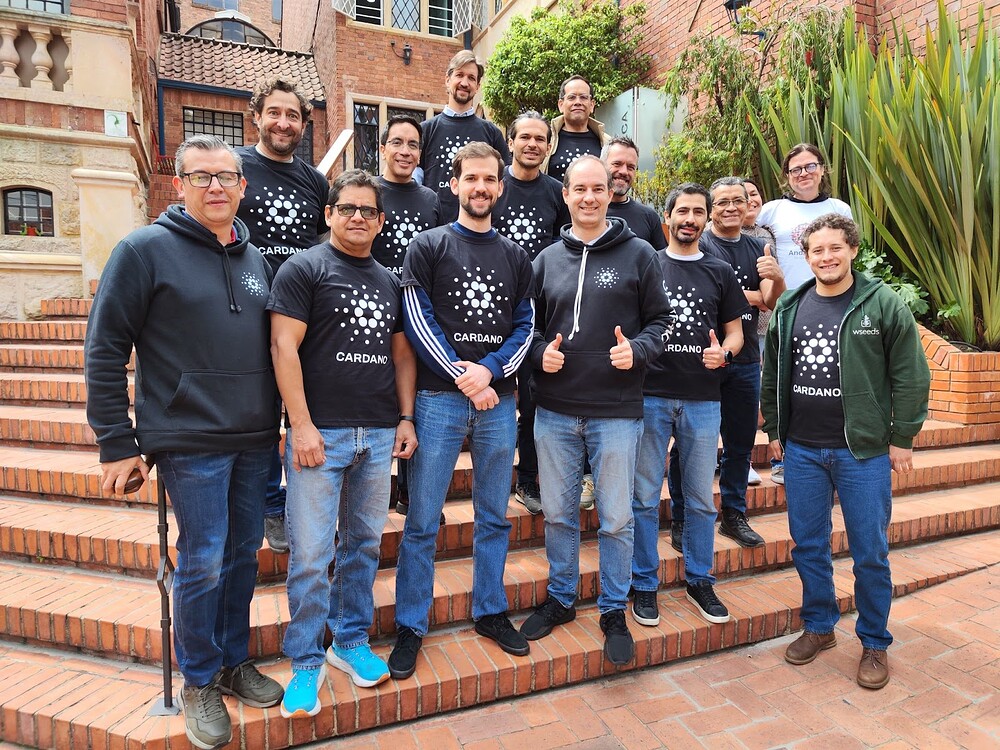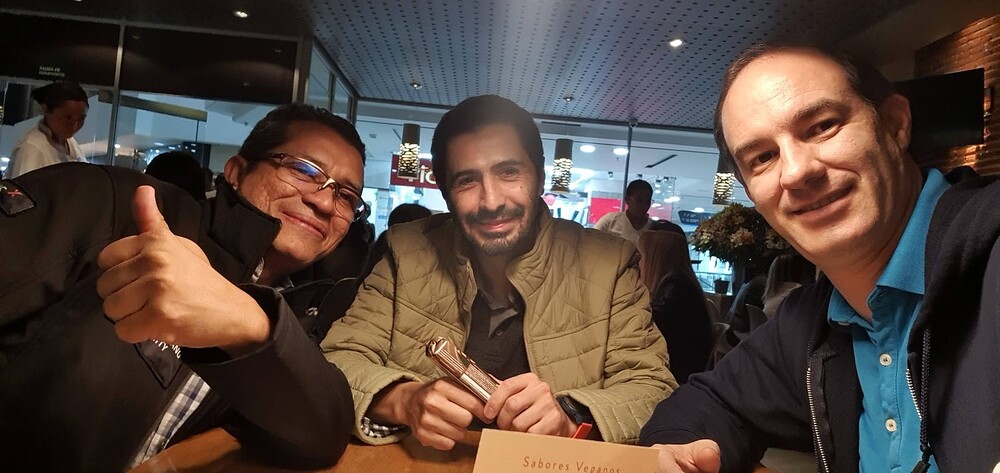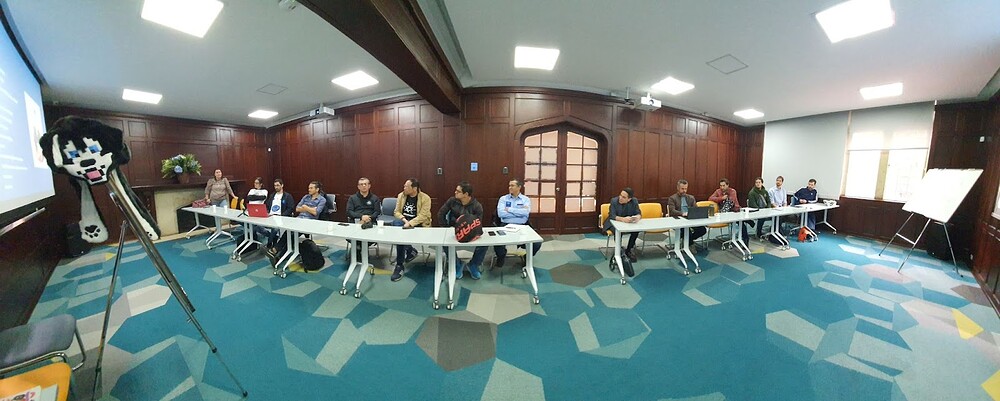dRep Recruitment, Training and Ethical Code of Conduct Workshop
February 24, 2024
Bogota, Colombia
Hosted by Jose M De Gamboa
(Interect’s Civics Committee - Latam Cardano Community - Project Catalyst)
I was delighted to host in Bogota, Colombia on saturday february 24th 2024 the last of the 5 global workshops that were part of funded Catalyst proposal (Community)
The conversation started on the evening of the 23 when a few of us met for dinner to greet attendees that were traveling from other cities and countries.
The workshop agenda went from 8:00 to 15:00, but some of the most enthusiastic attendees came in early in the cold Andean morning for a warm cup of the best coffee in the world.
As the very diverse group started to arrive it became clear that we were in for a rich conversation. As part of the design of the workshop, I pushed to have in the room a group that could contribute to the conversation from different perspectives and try to avoid staying in the echo chamber that having similar profiled attendees could bring. By this rationale, the list of 15 participants included active members from the Cardano community: SPOs, Investors, Developers, influencers and community managers; but it also included University professors in the field of mathematics and governance, we even had a few people that have nothing to do with blockchain but are domain experts in constitutional law, governance, philosophy and political strategy. Even though this design decision implied an additional effort had to be made both before and during the workshop to level up the knowledge about Blockchain and CIP 1694 for those less familiar with Cardano, it turned out to be a great feature that allowed for very high level input from many areas of expertise.
Another design decision that diverged from other workshops is that we did not work with Miro boards. I preferred to keep the experience analog by facilitating with more traditional white boards and sticky notes to avoid the distraction of having screens on the tables. This also turned out to work great as the human connection kept the principle of listening and building on other’s thoughts at its highest level.
The structure of the workshop was aimed at gathering insight about three specific themes:
- Drep Recruitment
- Drep Training and Support
- Drep Ethics
WHY DREP?
After a brief overview of the CIP1694 we dove into discussing the question “Why DReps?” Why would anyone want to become a DRep.
-
Intrinsic Motivations
- Self realization being part of a something larger than self
- Community well-being
- Revolutionize status quo
- Feeling relevant
- Representing values of your community/culture
-
Extrinsic Motivations
- Monetary rewards
- Influence over the treasury
- Prestige
- Protecting own investment
After a brief break, the group focused on reflecting about what DREPS need?
What do DREPS need to be effective?
We split the discussion in two:
A- From the Individual perspective (What a drep needs to know?)
- Self-knowledge Play your strengths, know how to compensate for your weaknesses (alliances, tools, etc)
- Leadership skills Representation is not just about gathering information and voting accordingly. It is also about mobilizing opinion of both the community, other dReps and SPOs.
- Purpose statement (how to build one)
- Systemic Vision understanding larger picture dynamics and the effects of your actions.
- Inspire Excellence in communication and teaching skills
- Self calibrating Being able to read how own paradigms need to evolve according to reality at all times.
- Ecosystem/industry understanding
- Governance system understanding
- At least basic technology/blockchain knowledge
B- From the ecosystem perspective (what tools will dreps need?)
- Mass communication (1 to many)
- Individual communication (1 to 1)
- Public square: a space to discuss and mature ideas publicly should allow for anonymous contributions and a way to show support.
- Governance explorer: A common place for all things governance, should feature searchable Governance Actions history, DReps’ voting record, delegation history, Accountability standard. Performance indicators, reputation score
- NO public campaign funding
- Ethic code observer body (should disclose observations in Governance explorer)
- Structured accreditation framework
Lunch time did not interrupt the engagement so some interesting conversations were held over a delicious Lasagna.
The final hours we concentrated on the Ethical considerations of the Drep role.
Ethic code considerations
A strong consensus in the group supporting the idea of transparency being at the core of dReps ethic behavior. We discussed different dimensions in which dReps should be transparent:
- Identity - Weather Doxed or not and consistent about other (if any) identities under they operate
- Alliances - Are there alliances with other dReps? With SPOs? With Constitutional Committee members? Part of a larger political group?
- Representation - What or who do you stand for?
- Ideas
- Industries (De-Fi, NFTs, Music, Builders, etc)
- Groups (Geographic, Political, Economic, etc)
- Decision making process and rationale
- Funding
- Conflict of interest
Accountability: An effective Ethic code framework should be opt-in rather than mandatory but it is advised to create an observer body that gives public visibility to the public about dreps adherence to such code.
Note: high power incentives will almost always derive unforeseen behaviors to trick the system. Any incentive framework should preferably an array of more subtle incentives. E.g. false positives case. At the moment influence over the treasury would seem such a high power incentive and therefore represents the highest driver for bad behaviors to manifest.
Participants: Daniel Vanegas, Juanita Jaramillo, Sebastian Pabon, Andres Mojica, Mario Garrido, Juan M Urueta, Juan F Giraldo, Arturo Harcker, Wilmer Varon, Wilson Suarez, Jaime Posada, Nicolas Gomez, Ciro Gelvez, Luis Restrepo and Jose M De Gamboa
Miro board link with transcribed raw data collected (in spanish): Sign up | Miro | The Visual Workspace for Innovation








